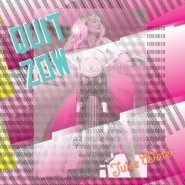 Quitzow
QuitzowJuice Water
Score: 83
Juice Water, the third album by singer/songwriter Erica Quitzow’s solo project Quitzow, was released on Tuesday. With Juice Water, Quitzow has created a delightfully energetic, electric album that, while defining its own electronic-art rock genre, displays every bit of her creativity in a way that makes the album extremely enjoyable. Juice Water is alternately a simple and a very complex pleasure, but it never ceases to be a pleasure.
The often simple lines of Juice Water clearly come from pure electronic dance music, lending them their outstanding levels of energy, even on the slower, lighter tracks (which themselves, are perhaps slightly overwhelmed by the hard edge of the percussion). Variation, however, is always extremely present through Juice Water, from the unexpected and outstanding use of the guitar on “Race Car,” to the drastic differences between the complex and the simple, even in the course of single tracks.
But what equally defines Juice Water is the transitions between the many, completely contrasting sections of every single track. Not only does this place Quitzow’s style in a genre of its own, but it also keeps the entirety of Juice Water engaging and completely interesting (save perhaps for “The Cut,” Juice Water’s longest track by nearly a minute). Juice Water has more than a few odd issues, from the some of the less successfully meshing synth parts of “Cherry Blossom,” to the occasional oversimplicity of tracks like “Talk to Me.”
Quitzow’s voice is quite possibly one of the most variable elements of Juice Water, thanks to an array of well-placed effects. However, one thing stays constant throughout the album: the incredible level of energy Quitzow expresses in every word. Whether her voice is taking on the electronic buzz of “Cherry Blossom” or the sweeping sound of “Race Car,” Quitzow’s voice directs the music expertly. Fading changes between vocal effects, such as on “More Keith Richards,” add a very unique sound that is simultaneously fluid and edged - an electric wave of sorts, carrying the power of Juice Water behind it.
Quitzow tends towards simple, expressive (and often quite amusing) lyics, putting the same energy into the words of Juice Water as she does the voice. The lyrics alternate between the descriptive: “Cherry blossom / Missed by a raging storm” and the simpler, honest: “It’s 3 AM / We’ve drank too much whiskey.” Whatever the tone, Quitzow does an excellent job matching the words to the tone of the music - whether it’s the questioning tone of “Talk to Me” or the aggressive nonchalance of “Whatever.” Occasional over-repetition does slightly weaken the lyrics, but it’s generally made up for by the skill with which they’re woven into the music. All together, Juice Water is quite well-written, and always entertaining.
Even with its few flaws, Juice Water would be entirely meritable solely on its uniqueness. As it is, Juice Water is also an extremely catchy, engaging album. Lyrics such as the playful transitioning between numbers, letters, and words on “The Cut:” “A, B, you know what I see?” and “One, two, I know you / I know that you know me too, three four…” mix perfectly with the ever-changing vocals. Additionally, except in one or two cases, the entirety of the transient sound somehow matches the stories Quitzow tells perfectly. Juice Water is, for all its purity, an incredibly complex album, and is in all settings, more than worth the listen.